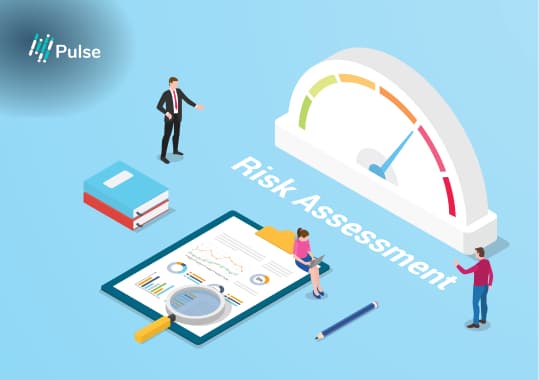The importance of financial insights in driving strategic decisions for SMEs has become increasingly apparent in the modern day’s data-driven economy. With the right tools, data can be pulled from anywhere, and with Financial Technology, or Fintech, accurate and actionable insights can be harvested and used to effectively navigate the complexities of any and all industry markets.
Now more than ever, businesses can leverage these insights to identify opportunities for growth, as well as address potential risks before they become problematic. Having access to the right methods, and effectively utilising financial data means businesses can work proactively to shape their own futures, and not just become another brand that is struggling to survive.
Going forward, we will touch on the significance of understanding financial insights, then explore some of the more important techniques for obtaining and analysing them. We will also look at how Pulse can support businesses by offering detailed analytics and real-time data that works to empower business owners.
Understanding Financial Insights
Getting to grips with financial insights should be a constant goal for business owners looking to expand, and for SMEs, being able to understand the data they aggregate equates directly into small business financial intelligence. Gaining these insights involves using tools and software to analyse patterns and trends within sets of financial data, aiding to discover anomalies or find foresights that can help with developing a business’s strategies.
SMEs can gather data from various sources, such as sales reports, customer interactions, expense records, or financial statements – the list goes on! – Each source can then be used to gain a different perspective on a business’s financial wellbeing, covering any number of metrics, from revenue generation through to resource allocation.
The analytics tools and techniques needed to turn raw data into financial insights utilises the use of robust financial software, and business owners can use this Fintech to perform numerous analyses, including trends as previously mentioned, but also profitability and variance. Advanced analytics is typically used to forecast trends, and enable entrepreneurs to take a proactive approach to problems, as well as develop business strategies that will help their enterprise succeed.
Techniques for Gaining Financial Insights
- Automated Financial Reporting: Utilising automated tools is quickly becoming a norm for businesses across all industries, especially as Machine Learning (ML) capabilities develop in tandem with the use of Artificial Intelligence (AI). SMEs can create accurate financial reports with minimal manual effort thanks to the software that tools like Pulse use to aggregate and present financial metrics through easily understood mediums. The accessibility of these insights, if capitalised on, can effectively empower business owners to make the correct adjustments needed to see their operations thrive.
- Predictive Analysis: Having the ability to create financial forecasts is an effective way for businesses to – to a degree – predict the future, through the employment of machine learning and algorithm techniques. These are effective because they work to identify possible future outcomes based on a company’s historical data. For businesses of all sizes, Fintech can be used to analyse any desired metric, from sales and service patterns, to customer behaviour. With the gathered financial insights an enterprise may then work proactively to create a strategic business plan based on the said data. When applied efficiently, businesses can be much better prepared for future challenges and opportunities.
- Segmentation and Benchmarking: One of the most effective ways to improve the analysis process, and to ensure the most useful financial insights are gained, is to segment any financial data you are gathering, stripping each metric down, and then focusing on them alone. Performances of individual product lines, customer groups, services, or even focusing on particular market regions, can help businesses much easier understand what is performing well, and what needs more attention. By then creating benchmarks for each of these metrics, businesses can set standards to aim towards and improve on.
- Key Performance Indicators (KPIs): Put simply, KPIs are metrics that business owners can use to measure any progress they have made towards objectives and goals. By identifying the KPIs that are most important to your operation, then monitoring them, enterprises can take a systematic approach to measuring their successes or struggles. They will help provide insights that guide strategic decision making, and by concentrating on KPIs, businesses can pinpoint the areas that require the most attention.
The KPIs Pulse can track for you:
- Turnover Trend: Pulse is capable of analysing your sales data to display the trend of your business’s turnover time, and will help you to understand your sales performances as well as seasonal fluctuations.
- Gross Margin Over Time: With permission from the user, by tracking revenue and costs of goods sold, our tool will provide insights into your business’s gross margin, with the aim of illustrating how your profitability evolves as your enterprise’s conditions change.
- Debtors and Creditors Ratio: Pulse will monitor the amount owed to and by your business, offering clear visuals through mediums such as simple bar and line graphs, as is the same with all of our measured metrics – helping to manage your cash flow more effectively.
Applying Insights to Seize Opportunities
- Strategic Decisions Making: The entire purpose of SMEs committing to methods that help generate financial insights, and ultimately lead to seized opportunities, is for them to be able to plan their strategies based on those insights. By leveraging this information, well formed decisions can be made based on real-time numbers that will prove invaluable when, for example, an expansion opportunity comes around. Companies can also use the data to adjust anything from pricing strategies to improving customer experiences, or simply figuring out which services are most popular among clients. The goal should be to evolve in alignment with these financial insights, and aim to gain an advantage over market competitors.
- Risk Management: In line with improved decision making, financial insights also allow businesses to improve their risk management. This is crucial for the sustainability of any business, and it means entrepreneurs will maintain a clearer perspective on their financial vulnerabilities, as well as any external market threats. By studying the trends and patterns that emerge, businesses can realise potential risks, and apply them to their strategies, and hopefully improve the choices they make by ensuring they are less likely to fail.
Applying these insight strategies to all areas of business, regardless of the industry, will help businesses anticipate changes, rather than react to them, and should ultimately lead to growth that is generated out of confident decisions based on solid data!
Parting Thoughts
Small business financial insights are invaluable and are worth the investment in time and resources for any business owner looking to make themselves successful. Being able to understand markets better, and develop strategies with precision and foresight should be seen as a complete necessity, especially in modern business where so many fintech tools are available which can help to get ahead.
Many tools like Pulse are now emerging to help business owners and finance professionals gain even deeper insights into their finances, and as predictive analytics improves, SMEs will likely be able to predict their capabilities reliably and with confidence unlike ever before, further helping to gain a competitive advantage and achieve sustainable growth.
Seize Opportunities with Pulse
Start unlocking your business’s greater potential today with Pulse. Our tools for accountants and business owners integrate with Open Accounting and Open Banking software to aggregate and present financial metrics via easily understood mediums, we will also send snapshots of your enterprise’s health directly to your inbox every month to keep you up to date. Sign up to gain access to our intuitive dashboard, helping to transform your financial data into strategic opportunities that will drive success!
Related Blogs


